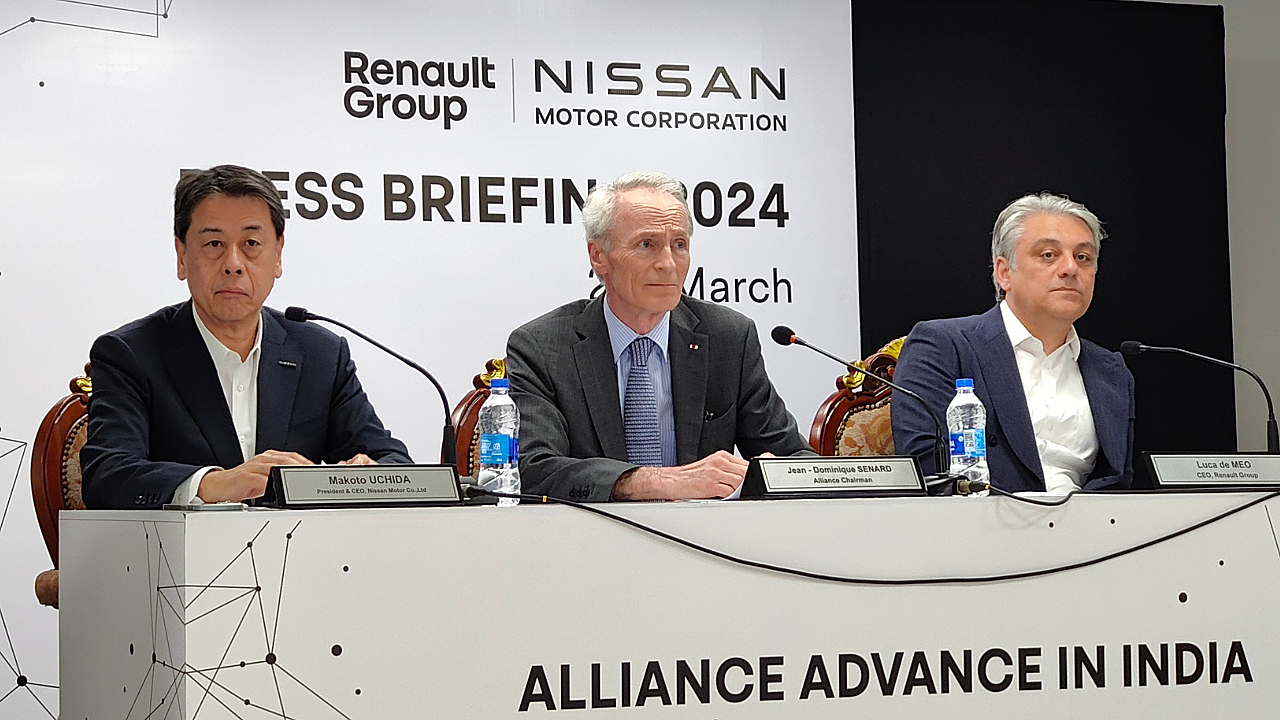
Celebrating its 25th anniversary, the Renault Nissan Alliance (RNA) unveiled a glimpse of its upcoming products set to roll off the assembly lines at Renault Nissan Automotive India Private Limited (RNAIPL), the duo's debutante dedicated plant.
Amidst the festivities, both partners announced plans to introduce four new vehicles this year, comprising two C-segment SUVs, including both 5-seater and 7-seater variants. This initiative marks a slight deviation from the initial announcement made last year, which had hinted at the launch of six products. Luca De Meo, CEO of Renault Group and Ampere, said the two products have been localised in several markets including South America, Turkey, Romania, Morocco, clocking over a million of sales.
In commemoration of this milestone, Jean-Dominique Senard, Chairman of the Alliance, Makoto Uchida, Director, Representative Executive Officer, President & CEO of Nissan, and Luca, graced the India operations with their presence. Their first collective appearance underscores the shared aspiration that India will continue to hold a pivotal role in the growth trajectory of their respective organisations.
Senrad said that following the recent reshaping of the Alliance, Renault and Nissan have entered into new agreements. The alliance partners have adopted a more flexible and locally driven project approach, enabling swift and agile decision-making tailored to regional needs. He believed that this approach will bolster its long-standing partnership, granting the organisations greater autonomy and accountability.
According to Senrad, the future endeavours for the alliance in India will encompass not only the development of its line-ups tailored to Indian markets and exports but also the advancement of new technologies such as autonomous driving, connectivity, and electrification for global markets.

Nissan’s Standpoint
Offering Nissan’s perspective, Uchida reaffirmed the alliance's commitment to India, citing RNAIPL as a prime illustration. He emphasised RNAIPL's pivotal role in manufacturing cars for both the domestic Indian market and global exports, solidifying its status as a critical asset for the alliance on a global scale. Uchida highlighted the plant's achievements, boasting a production of over 2.7 million cars to date, with 1.2 million units exported to over 100 destinations worldwide. Additionally, he noted that RNAIPL has also manufactured approximately 4.4 million powertrains, underscoring its significant contributions to the automotive industry.
'Our teams are actively exploring alternative energy options, including compressed natural gas and compatibility with ethanol,” he said. These efforts align with Nissan's overarching business strategy, 'The Arc,' that was unveiled a few days ago. India, within this framework, will serve as a significant export hub, targeting a exports level of 100,000 units for Nissan in the mid-term. This exemplifies its adept utilisation of the alliance while elevating the customer experience in India. “I am optimistic and enthusiastic about Nissan's growth trajectory in India, notwithstanding the challenges,' Uchida added.
Renault’s Outlook
From Renault's perspective, De Meo highlighted the pivotal role of RNTBCI - Renault Nissan Technology Business Centre India, emphasising its global connectivity and far-reaching impact across regions such as North America, Europe, and Latin America.
Acknowledging the complexities of the Indian market, De Meo remarked that while India presents immense opportunities, it's important to recognise the challenges. Many OEMs have faced setbacks, but Renault has remained steadfast in its commitment. He underscored Renault's proactive approach and collaborative efforts with stakeholders to cultivate a conducive environment for success.
Talking on the EV segment, he said the company is undergoing a comprehensive strategy overhaul, recognising its critical importance. The objective is to craft a robust, impactful, and sustainable plan. Public support is key to succeed in this pivotal area. “We also want to develop India as a 360° hub to serve Renault’s and alliance global ambitions, including in the activities with the most added value. For example, our ambition is for RNTBCI to become one of the main centres of excellence for Digital, Artificial intelligence, HMI & connectivity.
Navigating Complexities Of Indian Market
If a company can establish competitiveness in India, both for Indian consumers and against local competitors, it signifies the creation of a robust machine with global applicability. The aim, he said, is to harness the excellence found in India and integrate it into the alliance, extending its impact to the global market as well.
Furthermore, it's evident that government support will be pivotal in realising this vision. The company rely on authorities to foster an environment conducive to business success. As I often say, automotive is a team sport, and I think this is also something our contacts among the Indian authorities are well aware of, he said.
Also Read:
Next-gen Renault Duster is a C-segment challenger from the French automaker
Nissan Charts New Course For Sustainable Growth, Unveils ‘The Arc Business Plan